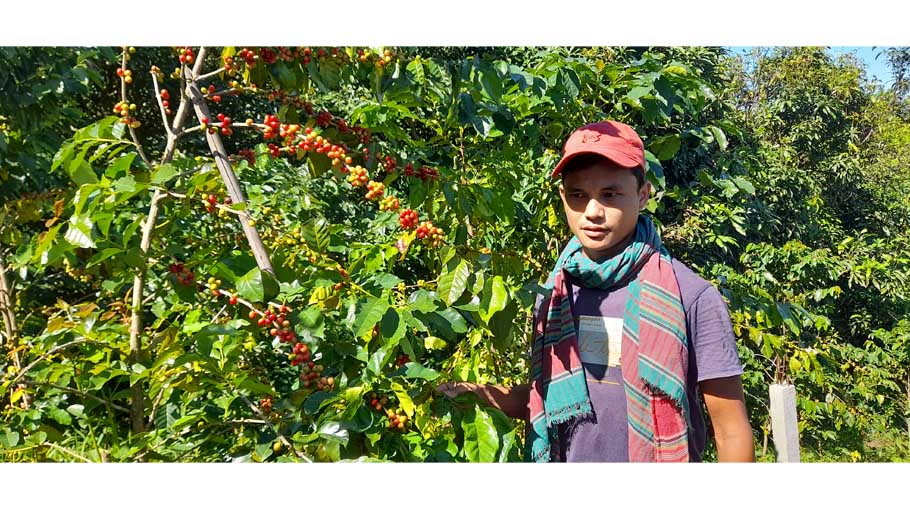Jhum farmers switching to coffee cultivation
DAE providing all kinds of cooperation to encourage farmers

Coffee has become quite a popular beverage in urban life. Drinking a cup of coffee increases mental strength and reduces the risk of diseases. In fact, the smell of coffee makes you feel better and help to get rid of any mental stress.
For various reasons, there came diversity in the occupations of the hill people. The Jhum farming based social system has shifted towards education, employment and commercial long-term cash crops long ago and increased involvement in the corporate world.
Due to the increase in population day by day and land leasing by various corporate entities, the space for Jhum farming on the hills has shrunk. So, Jhum farmers have become interested in cultivating various commercial orchards and cash crops now.
Farmer Ngui In Mro (32), Young Som Mro, Room Klam Mro, Men Rum Mro, Ren Nock Mro and many others are now weaving new dreams of becoming self-sufficient by cultivating coffee in Chimbuk hill at an altitude of 2,500 feet above sea level, about 26 km away from Bandarban district town.
Read more: Winter knocking at the door, still no demand for quilts in Dinajpur
Last year Ngui IN Mro sold 15 kg of coffee at Tk 200 per kg. This year more than 200 coffee trees have yielded. Trees that have high yields need additional support. He is hoping to get 30-40 kg of coffee this year. He wants to plant 3-4 thousand more coffee trees but is unable to get more saplings. He needs more cooperation from the agriculture department in this regard, he said.
The present one acre orchard has a total of one thousand trees and Ngui is now waiting for the harvest. He also said that if he gets two kg of coffee from each tree and sells it for Tk 200 per kg, he will earn Tk two lakh a year. Coffee seedlings start yielding from two years of planting, giving full yield from the third year. The tree survives for 70-80 years. Coffee trees usually bloom in January, a week after they turn into fruits, and by the end of November, the fruits start to ripen and farmers start harvesting them.
On-spot inspection of Chimbuk and Faruk Para shows that coffee is being cultivated as companion crop inside the mango and grapefruit orchards. Coffee seedlings have to be planted in the rainy season. They need adequate amount of shades, soil moisture and sunlight at the same time.
There are two types of coffee, Robust and Arabic. A kg of coffee beans with the peels intact is sold at Tk 200-250. A coffee tree yields fruits ranging from 5 kg to a maximum of 15 kg per year and continues to yield for 40-50 years.
Taidu Ram Tripura, a pioneer of coffee cultivation in Bandarban district, has been doing research on coffee farming for 12 years. He said he buys coffee with husks at Tk 200 per kg and without husks at Tk 350 from local coffee growers.
Taiduram Tripura after travelling to various countries of the world including Vietnam, Cambodia, Nepal, India and receiving training on coffee seedling production and planting as well as on care, production and marketing of coffee has returned to the country to cultivate coffee himself. He said he is cooperating with the coffee farmers with encouragement and training.
He added he has connected local coffee growers with the only coffee buying and selling company in the country, North End Coffee Roasters Company. There is no syndicate and the price of coffee is same all over the world so, farmers get a fair price.
He also said that the demand for coffee in the whole country is 5-6 tonnes in 3 months but, the production is very low compared to the demand in the country.
That is why the country's demand is met by importing coffee from Ethiopia and Brazil.
Dr. Safayet Ahmed Siddiqui, Deputy Director of the Horticulture Center at Balaghata Horticulture Centre, said that so far 9,750 Arabic coffee saplings have been distributed at government-fixed price after training 65 coffee growers.
SM Shah Neyaz, Deputy Director of Bandarban office of the Department of Agricultural Extension (DAE), said that the hilly areas are suitable for coffee cultivation due to the natural climate and soil. Especially coffee trees grow well in the old and planned mango orchards for the shade of the mango trees.
In Bandarban Sadar, Ruma, Rowngchhari, Thanchi and Lama Upazilas of the district coffee is being cultivated on 146 hectares of land in FY 2020-2021 while, coffee is being cultivated on 200 acres commercially and is being grown in 20 hectares. Coffee cultivation is increasing day by day.
Last year, 34 metric tonnes of coffee with husks were produced. 37,200 saplings have been distributed among 625 farmers from the Department of Agricultural Extension. Agricultural materials have also been distributed by imparting training to the farmers.
Last year there were 48 coffee farming agricultural exhibitions and this year 215 exhibition plots have been set. He further said that coffee processing machines have been provided to the farmers at fair prices and project proposals have been submitted to the ministry for setting up a coffee factory in Bandarban.
The official again said that due to the fact that the people of the country are less accustomed to drinking coffee, it is possible to earn a lot of foreign currency by exporting the produced coffee abroad and the people will also get a lot of employment.




